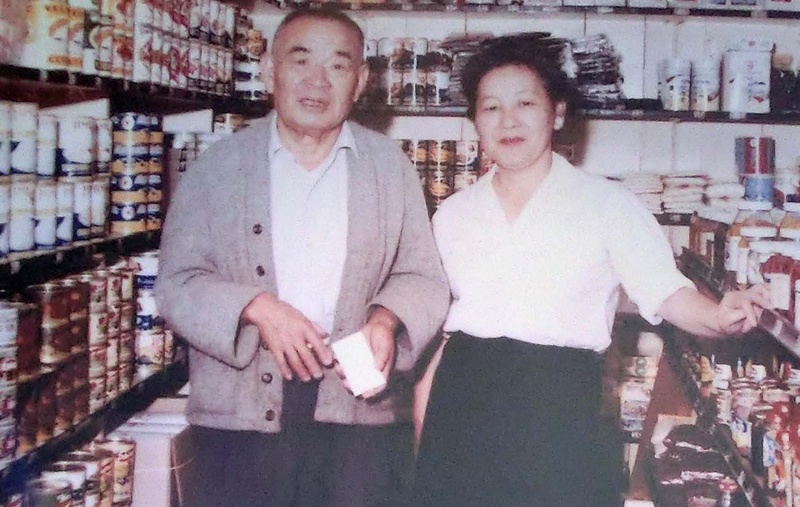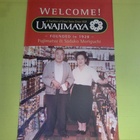Uwajimaya has grown through the solidarity of the Moriguchi family, but what created that solidarity was the love each family had for their family business, and the compassion of their seven children for their parents, the founders Fujimatsu and Sadako Moriguchi. On the other hand, it seems that the parents, especially Sadako's mother, played a major role in holding the family together.
The life of first-generation immigrants who came to America to earn money is often a continuous struggle. The Moriguchis also worked themselves to the bone, even without weekends, while raising their children, despite not having a wealthy life. Seeing their parents, the children naturally helped with the housework and business from a young age.
His father, Fujimatsu, was a typical Japanese man of the Meiji period. He was small, about 160 cm tall, but had a sturdy build. He had a gruff outward appearance, and was strict and never joked. His favorite saying was, "I was born with nothing, so I'll do whatever I want." His beliefs were, "Respect your superiors" and "Treat your customers with respect."
Be kind and gentle to everyone
On the other hand, his mother, Sadako, always supported her husband like a seasoned wife. She was quiet, modest, and gentle, and rarely got angry. However, she also had a strong will inside her and could exude a dignified dignity.
She was kind to her children, and to her customers, as well as to Japanese immigrants and sailors in distress, and to Japanese "brides" who had married Americans and come to Seattle, and she helped them without any business interest. She also had an understanding of music and the arts, and was the ideal mother for her children.
Sadako was born in Seattle on October 16, 1907, the third of nine children to Shozo Tsutakawa, originally from Okayama Prefecture, and his wife Hisa. Tsutakawa was a successful trader in Seattle, founding the Tsutakawa Company and exporting mainly lumber and metal scraps to Japan and importing a variety of other goods from Japan.
When Sadako was five years old, her father wanted her to receive an education in Japan, so she was sent to her maternal hometown and raised by her grandmother. Influenced by her grandmother, who was cultured and well-versed in poetry, calligraphy, Noh, and Kabuki, Sadako acquired an artistic education.
Renowned sculptor and painter George Tsutakawa is Sadako's younger brother, and like her, studied in Japan as a child and returned to the United States.
When Fujimatsu came to Seattle, Sadako was still in Japan, but Shozo was impressed by the young Fujimatsu's work ethic and saw him as a potential husband for his daughter, Sadako. When Sadako returned to Seattle from Japan in 1931, Shozo introduced her to Fujimatsu, and after two years of dating, they were married in 1933.
Thoughts on each mother
How did the children view Sadako as their mother? Tomio, the second son, who joined the family business to help his busy parents and served as president for many years as the founder of the company's revival, said:
"He was always calm, impartial, sociable and kind to everyone. He didn't judge people by their status or title, and he often treated students from Japan and sailors to delicious meals. When the single people who lived in the hotel above the restaurant fell ill, my mother would look after them. He was kind to people without families and many people relied on him."
Suwako, the eldest daughter, who lived in Japan as a child, saw her mother as a very cultured person. She also remembers her mother's firmness, perhaps because she was the eldest daughter.
"I was a hard worker, always doing something. One thing I remember my mother saying was, 'If you're going to be rude to customers or give them a dirty look, then you don't have to come to the store.' That's what I was taught."
The fourth son, Toshi (Toshikatsu), remembers his mother as always thinking about others, and having the memory to remember even the family of a customer. Sadako treated everyone the same, as can be seen from Toshi's words, "At my mother's funeral, it was hard to believe, but everyone was saying the same things about her."
"My mother treated everyone in the family fairly. When I first got married, she treated my wife like her own daughter. When I think of my mother, the word that comes to mind is 'kindness.' I want to pass that on to my children," says Tosi.
"She was very calm, very kind, and always kind to everyone," emphasizes the second daughter, Hisako. "As far back as I can remember, my mother always worked in the store. I think she worked until she was 85. She made sushi. I often helped her make sushi rolls. On New Year's Eve, we made 500 sushi rolls and 2,000 to 3,000 inari sushi. We worked until 3 or 4 in the morning, and when we were done, we took them out and prepared them in the store."
Tomoko, the third daughter, says of her mother, "She was very cultured and well-educated, knowledgeable about music, and she also taught us art."
Sadako, who loved traveling and music, passed away on July 25, 2002, at the age of 94, 40 years after the death of her husband, Fujimatsu.
(Titles omitted)
© 2018 Ryusuke Kawai







